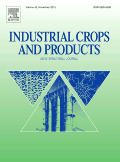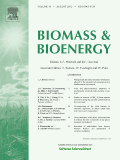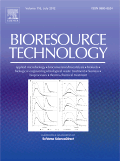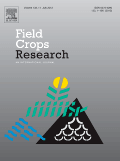
INDUSTRIAL CROPS AND PRODUCTS
Scope & Guideline
Elevating Knowledge in Crop Diversification and Applications
Introduction
Aims and Scopes
- Biomass Conversion Technologies:
Research dedicated to innovative methods for converting lignocellulosic biomass into biofuels and biochemicals, including studies on enzymatic hydrolysis, fermentation technologies, and thermochemical processes. - Sustainable Agricultural Practices:
Exploration of sustainable agronomic techniques aimed at enhancing crop yield and quality while minimizing environmental impact, including studies on crop rotation, intercropping, and biotic stress management. - Biopolymers and Biocomposites:
Investigation into the development of biopolymers and biocomposites from renewable resources, focusing on their mechanical, thermal, and environmental properties for various applications in packaging, construction, and textiles. - Plant Secondary Metabolites:
Studies focusing on the extraction, characterization, and application of bioactive compounds from plants, including their potential uses in pharmaceuticals, nutraceuticals, and natural pesticides. - Waste Valorization:
Research on the conversion of agro-industrial waste into valuable products, including biochar, activated carbon, and other functional materials, emphasizing circular economy principles. - Nanotechnology in Biomass Utilization:
Application of nanotechnology in enhancing the properties of biomass-derived products, including the development of nanocomposites and nanocarriers for improved performance in various applications.
Trending and Emerging
- Deep Eutectic Solvents (DES) Applications:
Increasing interest in the use of deep eutectic solvents for biomass pretreatment and extraction processes, highlighting their efficiency and environmental benefits compared to traditional solvents. - Biomass-derived Functional Materials:
A growing focus on developing advanced functional materials derived from biomass, including biodegradable plastics, nanocomposites, and materials with specific properties for targeted applications. - Integrated Biorefinery Approaches:
Emerging research on integrated biorefinery systems that combine multiple processes for the concurrent production of biofuels, biochemicals, and other valuable products from biomass. - Microbial and Enzymatic Processes:
An uptick in studies exploring microbial and enzymatic processes for biomass conversion, emphasizing the use of microbial consortia and engineered enzymes to enhance efficiency. - Sustainable Crop Management Practices:
An increasing trend in research dedicated to sustainable crop management practices, including precision agriculture, organic farming, and the use of cover crops to improve soil health and productivity.
Declining or Waning
- Traditional Chemical Processes:
There has been a noticeable decline in research focused on traditional chemical processes for biomass conversion, as newer, more sustainable and eco-friendly methods are being prioritized, such as enzymatic and biotechnological approaches. - Non-renewable Resource Utilization:
Research topics centered around the use of non-renewable resources or fossil-fuel-based approaches have decreased, as the industry shifts towards sustainable practices that emphasize renewable materials and processes. - Single-use Plastics and Materials:
As environmental concerns grow, studies focusing on single-use plastics derived from non-renewable sources are declining, with a shift towards biodegradable and compostable materials. - Conventional Crop Production Techniques:
Interest in conventional agricultural practices has waned as researchers increasingly explore sustainable and regenerative farming techniques that enhance soil health and reduce chemical inputs. - Low-Value Biomass Applications:
Research on low-value biomass applications has diminished as the focus shifts toward high-value products and processes that enhance the economic viability of biomass utilization.
Similar Journals

CANADIAN JOURNAL OF PLANT SCIENCE
Cultivating Knowledge for a Sustainable FutureCanadian Journal of Plant Science (ISSN: 0008-4220, E-ISSN: 1918-1833) is a prestigious publication dedicated to advancing research in the fields of agronomy, horticulture, and plant science. Published by Canadian Science Publishing, this journal has been a cornerstone in the Canadian and international scientific community since its inception in 1973. With a solid presence in reputable databases, it ranks in the Q3 category for multiple disciplines as of 2023, reflecting its impact and relevance within the agricultural sciences. The journal serves as a vital resource for researchers, professionals, and students, encouraging the dissemination of innovative findings and fostering collaboration across disciplines. Although it is not an open-access journal, subscribers gain exclusive access to a wealth of knowledge, with articles aiming to enhance the understanding of plant systems and contribute to sustainable agricultural practices. The Canadian Journal of Plant Science remains committed to supporting the growth of plant-related research and its practical applications in today's changing environmental landscape.

Crop Journal
Advancing sustainable agriculture through innovative research.Crop Journal (ISSN: 2095-5421; E-ISSN: 2214-5141) is a premier, open access journal published by KEAI PUBLISHING LTD, dedicated to advancing the fields of agronomy and plant science. Established in 2013, this journal has quickly established itself as a vital resource for researchers, professionals, and students, achieving a remarkable Q1 ranking in both Agronomy and Crop Science, as well as Plant Science. With an impressive position in the Scopus rankings—30th out of 516 in Plant Science and 25th out of 406 in Agronomy—it stands at the forefront of scholarly discourse, representing the latest innovations and research breakthroughs within the global agricultural community. The journal embraces a broad scope that encompasses all aspects of crop science, aiming to foster understanding and propel advancements in sustainable agricultural practices. Accessible from anywhere in the world, Crop Journal plays a crucial role in disseminating knowledge that addresses the challenges of food security and environmental sustainability, making it an indispensable tool for those invested in the future of our planet's agriculture.

BIOMASS & BIOENERGY
Transforming Waste into Renewable WealthBIOMASS & BIOENERGY, published by Pergamon-Elsevier Science Ltd, is a premier academic journal focusing on the interdisciplinary fields of biomass and bioenergy research. With its impressive impact reflected in its 2023 Q1 rankings across multiple categories, including Agronomy and Crop Science, Forestry, Waste Management and Disposal, and a solid Q2 in Renewable Energy, Sustainability and the Environment, this journal stands at the forefront of advancing knowledge in renewable resources and sustainable practices. Established in 1991, it serves as a vital platform for researchers, professionals, and students to disseminate groundbreaking studies and innovative findings that shape the future of renewable energy. Though it does not currently offer open access, the journal's high ranking on Scopus, particularly its 95th percentile rank in key agricultural and environmental science categories, underscores its significance in promoting critical discourse and scientific advancements in biomass utilization and energy generation.

BIORESOURCE TECHNOLOGY
Empowering Change with Groundbreaking Bioresource InnovationsBioresource Technology, published by Elsevier Science Ltd, is a leading journal in the fields of bioengineering, environmental engineering, and sustainable resource management. With an impressive impact factor reflected in its Q1 rankings for 2023 across multiple relevant categories, it stands out as a premier source for groundbreaking research from its inception in 1991 to its anticipated contributions through 2024. Bioresource Technology promotes the advancement of technologies and methodologies aimed at the sustainable utilization of biological resources, playing a pivotal role in tackling the challenges of waste management, renewable energy, and environmental protection. Researchers and practitioners are encouraged to contribute and engage with high-quality studies that have significant implications for the global push towards sustainability and innovation. Although the journal does not currently offer Open Access, its subscription model ensures that the rigorous peer-reviewed content remains accessible to those dedicated to advancing the field.

Bioresources and Bioprocessing
Unlocking the Potential of Biological ResourcesBioresources and Bioprocessing is an esteemed open-access journal published by SPRINGER HEIDELBERG, dedicated to the innovative fields of biomedical engineering, biotechnology, food science, and renewable energy. Since its inception in 2014, the journal has rapidly established itself as a leading platform for high-quality research, boasting a Q2 ranking in key categories such as Biomedical Engineering and Biotechnology, and an impressive Q1 status in Food Science for 2023. With robust Scopus rankings placing it in the top percentiles across multiple disciplines, Bioresources and Bioprocessing serves not only as a conduit for original research but also for critical insights into sustainable bioprocessing techniques that contribute to environmental stewardship. It is particularly aimed at researchers, professionals, and students committed to advancing knowledge in the bioprocessing sphere, promoting evidence-based innovations that leverage biological resources for diverse applications. Emphasizing open access, the journal ensures that cutting-edge research is readily available to a global audience, reinforcing its commitment to scientific communication and collaboration.

Biotechnology for Biofuels and Bioproducts
Advancing Sustainable Solutions Through BiotechnologyBiotechnology for Biofuels and Bioproducts is a premier international journal published by BMC, situated in the United Kingdom, focusing on the critical intersection of biotechnology and sustainable energy solutions. Established as an Open Access platform in 2022, this journal aims to disseminate high-quality research that advances our understanding of biofuels, bioproducts, and their applications within environmental sustainability. With its commendable Q2 ranking in multiple relevant categories including Applied Microbiology and Biotechnology and Renewable Energy, this journal serves as a vital resource for researchers, industry professionals, and students seeking to explore innovative biotechnological approaches to address global energy challenges. The journal emphasizes interdisciplinary research, fostering collaboration among scientists in biotechnology, environmental science, and policy-making. As it continues to publish impactful findings until 2024, Biotechnology for Biofuels and Bioproducts remains essential for those dedicated to advancing sustainable methodologies in energy and resource management.

Chemical and Biological Technologies in Agriculture
Unlocking the Potential of Chemical and Biological TechnologiesChemical and Biological Technologies in Agriculture is a premier open-access journal published by SPRINGER, dedicated to advancing research in the fields of agronomy, crop science, biochemistry, biotechnology, and food science. Established in 2014, this journal has quickly gained recognition, boasting impressive rankings with Q1 status in Agronomy, Crop Science, Biotechnology, and Food Science categories as of 2023, underscoring its significance in fueling innovations in agricultural technology. With an E-ISSN of 2196-5641, it provides a platform for researchers and practitioners to disseminate impactful findings and methodologies that address key challenges in sustainable agricultural practices. By facilitating open access to contemporary research, the journal aims to foster collaboration and knowledge exchange among multidisciplinary stakeholders in the agricultural sector. With a commitment to excellence reflected in its Scopus rankings, notably #57 in Agronomy and Crop Science, it serves as an invaluable resource for professionals, researchers, and students striving for breakthroughs in chemical and biological technologies. The journal remains at the forefront of addressing global food security and environmental sustainability through rigorous scientific inquiry.

BIOSYSTEMS ENGINEERING
Empowering scientists to engineer a better biosphere.BIOSYSTEMS ENGINEERING, published by Academic Press Inc. Elsevier Science, is a leading journal that has established itself as a key contributor in the fields of agronomy, crop science, animal science, food science, soil science, and control systems engineering. With an impressive position in the 2023 Category Quartiles, featuring Q1 rankings in Agronomy and Crop Science, Animal Science and Zoology, Food Science, and Soil Science, alongside a Q2 ranking in Control and Systems Engineering, this journal stands at the forefront of innovative research. Currently indexed in Scopus, it boasts a commendable track record, with its Agricultural and Biological Sciences rankings placing it in the 95th percentile for Agronomy and Crop Science and the 90th percentile for Soil Science, among others. With a commitment to disseminating critical advancements and fostering scientific dialogue, BIOSYSTEMS ENGINEERING offers an invaluable platform for researchers, professionals, and students alike, seeking to advance their understanding and application of engineering principles in biological systems. As a hybrid journal that provides both subscription and open access options, it ensures broad accessibility to high-quality research that shapes the future of sustainable agriculture and biological systems.

Agrivita
Bridging knowledge gaps in agronomy and crop science.Agrivita is a distinguished, open-access journal dedicated to advancing research and knowledge in the fields of Agronomy and Crop Science. Published by Brawijaya University, Faculty of Agriculture, this journal has been providing a platform for high-quality scholarly articles since 2010. Located in the vibrant country of Indonesia, Agrivita plays a vital role in the exchange of innovative agricultural research, particularly within the Southeast Asian context. As of 2023, it holds a respectable Q3 ranking in its category, showcasing its commitment to scholarly excellence and visibility. With an increasing impact on the academic community, and its current Scopus rank placing it in the 48th percentile, Agrivita stands as a crucial resource for researchers, professionals, and students eager to deepen their understanding of crop science and agronomy. The journal's scope encompasses cutting-edge research that addresses both fundamental and applied aspects of agriculture, ensuring it remains relevant to today's pressing agricultural challenges. Its open access model enhances global accessibility, fostering a collaborative environment where diverse opinions and findings can converge.

FIELD CROPS RESEARCH
Pioneering Discoveries in Agronomy and Soil ScienceFIELD CROPS RESEARCH is a premier academic journal published by Elsevier, dedicated to advancing knowledge in the fields of Agronomy and Crop Science as well as Soil Science. Now in its 46th year of publication, this esteemed journal has established itself as a leading resource, holding a prestigious Q1 ranking in both the Agronomy and Soil Science categories, with a remarkable blend of rigorous peer-reviewed research and innovative findings. With a Scopus ranking of #27/406 in Agronomy and #20/159 in Soil Science, and a notable 93rd and 87th percentile respectively, FIELD CROPS RESEARCH plays a vital role in informing practices that drive sustainable agriculture and optimize crop production. Although not an open access journal, it remains highly accessible to the global research community and offers critical insights that influence policy and agricultural practices worldwide. Researchers, professionals, and students are encouraged to delve into this journal, as it continues to shape the future of field crop research through impactful studies and comprehensive reviews.